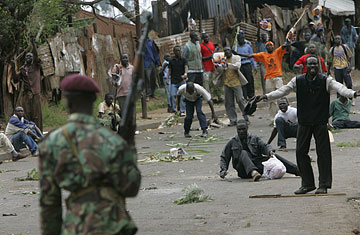
Opposition supporters taunt police during riots in the Nairobi slum of Kibera, Dec. 31, 2007
Kenyan police and opposition protesters fought running battles across the capital Nairobi on Thursday, as riot police blocked the opposition from holding a mass demonstration in the city center and tribal violence raged on the outskirts.
Clashes between the police and the Orange Democratic Movement (O.D.M.) were largely confined to scuffles and tear gas. But on the outskirts, the tribal violence that has raged in Kenya for five days claimed scores more victims. A mob from the Luo tribe rampaging through the township of Mathare stoned one unidentified man to death before stealing his shoes, hacked another man from the Kikuyu tribe about the head with a machete and set a gas station on fire, gutting the buildings, pumps and five vehicles. By the end of the day, the toll had risen from just more than 300 to 346, according to media reports. But fears of far more bloodshed were averted when, faced by hundreds of riot police, the O.D.M. called off plans for tens of thousands of its activists to march to Uhuru Park in the center of Nairobi to "inaugurate" their leader, Raila Odinga, as the "people's president." Party workers said the protest was merely being postponed, either until Friday or Tuesday.
Odinga claims the incumbent President Mwai Kibaki rigged the Dec. 27 general election when Odinga was on the verge of winning. That allegation has been backed by statements from the U.S., Britain and European Union observers alleging irregularities in the counting process. It was further strengthened Thursday when Kenya's attorney general called for an independent investigation into the poll. "It is necessary... that a proper tally of the valid certificates returned and confirmed should be undertaken immediately on a priority basis by an agreed and independent person or body," Attorney General Amos Wako said. The country, he added, was "quickly degenerating into a catastrophe of unimaginable proportions."
South African archbishop Desmond Tutu arrived in Nairobi overnight after being dispatched by Nelson Mandela's high-profile mediation group The Elders. However, Tutu's efforts to broker a compromise between the two sides had little immediate success. While he met Odinga, Tutu told a press conference he was unable to make an appointment with Kibaki. "This is a country that has been held up as a model of stability," said Tutu. "This picture has been shattered. This is not the Kenya that we know."
Soon afterwards, in his first public appearance since he was sworn in, Kibaki called for calm, said he would talk to "concerned parties" once that was achieved and urged "leaders" to restrain themselves and their supporters "from engaging in unlawful activities." Security forces will remain "vigilant" and "deal firmly" with those who broke the law.
Meanwhile, Odinga visited the city mortuary, where his aides opened up lockers and displayed the dead to the press. On the steps of the building, with the stench of bodies in the air, Odinga declared Kibaki "a thief" and added: "I have no other power to change what is happening right now. [The people] voted for change and what they got is the continuation of the status quo. So people must address the cause of this problem, not the consequence. The cause of the problem is the rigging of elections."
Prospects of a resolution are distant, not least because the rivalry between the two leaders is personal. Kibaki and Odinga were once political allies and Odinga backed Kibaki in the 2002 election, in return for a promise that Kibaki would change the constitution to create the position of Prime Minister — which he would then hand over to Odinga. That never happened and the pair fell out.
Though regarded as one of Africa's most stable nations, violence has often accompanied elections in Kenya. That's because political rivalry often reflects tribal divisions. Kibaki's Kikuyu are the largest of the country's 42 tribes and have dominated politics and business since independence in 1963. Odinga is a Luo, the third largest tribe. Luos, who have never had a President, have been the most vocal in their criticism of Kikuyu dominance.
Fueling particular anger is how corruption reserves much of Kenya's riches for the Kikuyu elite, and condemns millions to poverty. Despite an economy that grew at 6.2% last year, 55% of Kenya's 36 million population live on less than $2 a day. Though Kibaki was elected on an anti-corruption ticket in 2002, he proved a disappointment: graft and cronyism have thrived and his anti-corruption tsar John Githongo fled to London in 2005. Githongo never explained why he left Kenya. He reportedly had begun to doubt the government's commitment to tackling corruption and had received death threats.
